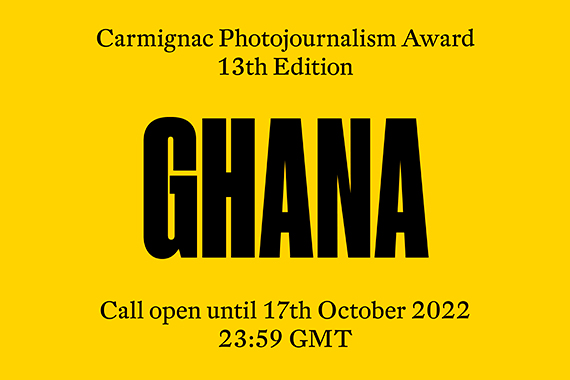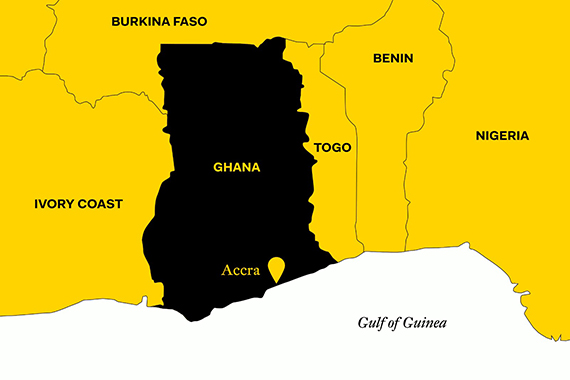
13th Edition of the Carmignac Photojournalism Award
Ghana
Call for applications:
Mon 17 Oct

13th Edition of the Carmignac Photojournalism Award
Call for Applications: Ghana
Deadline for Applications: Monday, October 17, 2022 at 11:59pm (GMT)
The 13th edition of the Carmignac Photojournalism Award (Prix Carmignac du photojournalisme) will focus on Ghana and the ecological and social challenges the country faces.
Although a benchmark in West Africa for its political stability and multiple political parties, the cradle of pan-Africanism must confront its proliferating open dumps—such as Agbogbloshie, where nearly 80,000 people reside. The United Nations Environment Programme (UNEP) has identified Ghana as one of the world's top sites of electronic waste.
International law mobilized to limit the transport of hazardous waste with the Basel Convention in 1992, followed by the Bamako Convention in 1998. Yet no change has been implemented. Swayed by lower costs, Western Europe is one of the regions that exports the most illegal waste today—nearly 600,000 tonnes per year—despite having its own efficient recycling centres.
About 95% of electronic waste in Ghana is collected and recycled through the informal economy. Without any health regulations, this work is often carried out by untrained minors seeking to recover valuable materials, such as copper and gold. These individuals are exposed to hundreds and hundreds of harmful substances, including lead and mercury. These are not biodegradable and accumulate in the ecosystem and living beings. According to WHO (World Health Organization): "A child who consumes even a single chicken egg from Agbogbloshie will absorb 220 times the daily limit of chlorinated dioxins (environmental pollutants)."
Photography has played an important role in the life of this post-colonial society, bearing witness to daily and family life as well as revealing a political and cultural golden age in the 1960s and 1970s. It is important today that this medium confronts realities that challenges the utopia of a common world championed since independence.
The Carmignac Photojournalism Award (Prix Carmignac du photojournalisme) aims to support the production of a journalistic photographic project that documents this ecological, social and international crisis.
The jury
The jury for the 13th edition will gather in Paris in November 2022. It is made up of:
James Barnor - CHAIR
Photographer
Alona Pardo
Curator, Barbican Art Gallery
Azu Nwagbogu
Independent curator, Director and Founder of African Artists' Foundation and LagosPhoto Festival
Fabiola Ferrero
Laureate of the 12th edition of the Carmignac Photojournalism Award
Vera D. Kwakofi
Senior News Editor, BBC World Service, responsible for the BBC’s International TV Operations in Africa
Lars Lindemann
Director of Photography and deputy visual director, GEO and PM
Dr Kees Baldé
Senior Scientific Specialist, United Nations Institute for Training and Research (UNITAR)
The pre-jury
The pre-jury has the task of pre-selecting between 12 and 15 proposals. It is made up of:
Mikko Takkunen
Photo Editor International, The New York Times
Fiona Shields
Head of Photography at The Guardian
Nicolas Jimenez
Director of Photography at Le Monde
Selection Process
The selection of the laureate will take place in two stages:
1. The pre-jury, made up of directors of photography, has the task of selecting between 12 and 15 proposals from those received.
2. The jury, consisting of specialists in photography and in the given theme, choose a winning project. At the end of the selection process, the jury meets the winning photographer, in order to talk to him or her and, if necessary, to provide the support he or she will need throughout the duration of their project – from the preparation of the reportage to its final exhibition.
The photographers will need to submit their dossier before October 17, 2022 at 11:59pm (GMT) directly here: prixcarmignac/application
Submission is entirely free of charge.
The Carmignac Photojournalism Award
In 2009, while media and photojournalism faced an unprecedented crisis, Edouard Carmignac created the Carmignac Photojournalism Award to support photographers in the field. Every year, it funds the production of an investigative photo reportage on human rights violations and geo-strategic issues in the world. The Fondation Carmignac provides the laureate with human and financial resources to carry out their project and produces both a monograph and a traveling exhibition, aiming to shed light on the crises and challenges which the contemporary world is facing.
Previous editions of the Carmignac Photojournalism Award have focused on: Gaza (Kai Wiedenhöfer); Pachtunistan (Massimo Berruti); Zimbabwe (Robin Hammond); Chechnya (Davide Monteleone); Iran (Newsha Tavakolian); Guyana (Christophe Gin); Libya (Narciso Contreras); Nepal (Lizzie Sadin); and the Arctic (Kadir van Lohuizen and Yuri Kozyrev); the Amazon (Tommaso Protti) and the Democratic Republic of Congo (Finbarr O’Reilly and the collective of photographers for the project "Congo in Conversation"). The 12th edition of the Carmignac Photojournalism Award is dedicated to Venezuela and its human, social and ecological challenges. The laureate, Fabiola Ferrero, will present her report "Venezuela, The Wells Run Dry" at the Refectoire des Cordeliers in Paris from October 28-November 22, 2022.
More information: www.fondationcarmignac.com
Fondation Carmignac
The Fondation Carmignac was founded in 2000 by Edouard Carmignac, a French entrepreneur, CEO and Chairman of asset management company Carmignac. Today, it is structured around three main pillars which developed one after the other. The Carmignac Collection, which has over 300 works of contemporary art, the Carmignac Photojournalism Award and the Villa Carmignac in Porquerolles which offers temporary exhibitions and a rich cultural programme in a 2000-square-meter art space set in a 15-hectare estate at the heart of a protected site.
More information: www.fondationcarmignac.com
